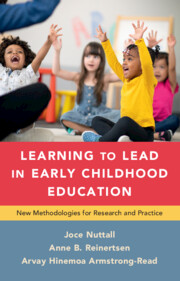Book contents
- Learning to Lead in Early Childhood Education
- Learning to Lead in Early Childhood Education
- Copyright page
- Contents
- Figures
- Acknowledgments
- Chapter 1 The Impetus for This Book: Our Early Childhood Leadership Think Tank
- Chapter 2 Nau mai e Hine ki te Aoturoa a tou tupuna a Tanematuai tiki ai ki roto o Matangireia i a Io Matangaro, i roto o Rangiātea a whata ana
- Chapter 3 Te Kete Aronui
- Chapter 4 Leadership as Change
- Chapter 5 Knowledge Possibilizing
- Chapter 6 A Cultural-Historical Activity Theory Perspective on Learning to Lead
- Chapter 7 Leading Organizational Change: The Case of Haneul Early Learning Center
- Chapter 8 A Conversation between Approaches
- References
- Index
Chapter 2 - Nau mai e Hine ki te Aoturoa a tou tupuna a Tanematuai tiki ai ki roto o Matangireia i a Io Matangaro, i roto o Rangiātea a whata ana
Published online by Cambridge University Press: 17 August 2023
- Learning to Lead in Early Childhood Education
- Learning to Lead in Early Childhood Education
- Copyright page
- Contents
- Figures
- Acknowledgments
- Chapter 1 The Impetus for This Book: Our Early Childhood Leadership Think Tank
- Chapter 2 Nau mai e Hine ki te Aoturoa a tou tupuna a Tanematuai tiki ai ki roto o Matangireia i a Io Matangaro, i roto o Rangiātea a whata ana
- Chapter 3 Te Kete Aronui
- Chapter 4 Leadership as Change
- Chapter 5 Knowledge Possibilizing
- Chapter 6 A Cultural-Historical Activity Theory Perspective on Learning to Lead
- Chapter 7 Leading Organizational Change: The Case of Haneul Early Learning Center
- Chapter 8 A Conversation between Approaches
- References
- Index
Summary
Although Indigenous theories of knowledge have regained much ground in recent years, their application to early childhood education remains rare. This chapter outlines the ontology, epistemology, and methodological principles of kaupapa Māori theory, which has been brought to studies of education in Aotearoa New Zealand in recent decades. As is customary in Māori culture, the author opens with her whakapapa, or genealogy, locating herself in relation to the reader and to the text that follows. The chapter begins by briefly outlining the cosmological ontological origins of kaupapa Māori theory. It then turns to the principles of mātauranga Māori (Māori epistemology), and how these principles are operationalized as tikanga Māori (customary practices) to influence research methodology and practice. The chapter concludes with a short description of the case study described in Chapter 3 of this book and how it was informed by the sequential knowledge framework of Te Ao Māori, Te Reo Karanga o Matangireia, kaupapa Māori, kaupapa Māori theory, and tikanga Māori.
- Type
- Chapter
- Information
- Learning to Lead in Early Childhood EducationNew Methodologies for Research and Practice, pp. 17 - 33Publisher: Cambridge University PressPrint publication year: 2023



